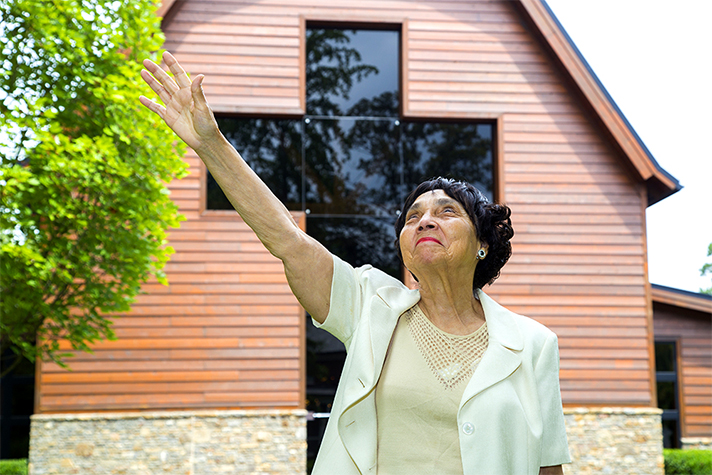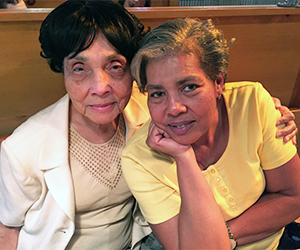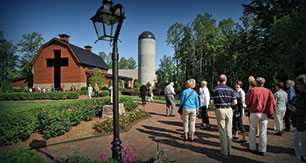
They knew who she was as soon as she started talking. Though they’d never met, her soft voice was as familiar as an old friend’s.
Minnie Washington walked in the doors of the Billy Graham Library in August. It was her first visit, though thousands of people have heard her voice within its walls. It’s the same voice that recounts her experience becoming a Christian back in the ’50s after watching Billy Graham on TV.
She talks about it in a video at the end of the Library’s Journey of Faith tour, which chronicles the life of Billy Graham and explains the Gospel he has preached for decades. Throughout her visit, one Library volunteer after another came up to her saying things like, “I know you!” Each one recognized her voice from the video, and some shared the impact her story has had on other Library visitors.

Minnie later took time to tell her story again, this time in person.
“It was the third Saturday in September, 1957,” Minnie said, sitting in a booth at the Library’s Dairy Bar.
Her husband, Carl, had recently become a Christian and invited his wife to watch a program on TV that night.
“He had been saved. I hadn’t. In fact, I didn’t know what being saved meant,” Minnie said.
The Maryland couple was in their 20s with four children—they later added two more to the mix—and Carl had been praying that his family would accept Christ.
“The next thing I see is this good looking man who gets up to the podium,” Minnie said, “and I said to Carl, ‘Is this a movie star?’”
It wasn’t a movie star, but Billy Graham, about to share something from the Bible. Of all the Scriptures he could have preached from, it was Joshua 24:15: “…Choose this day whom you will serve. … But as for me and my house, we will serve the Lord.”
All of Minnie’s life, she’d heard preachers telling people they were going to hell for being sinners.
So when she heard Billy Graham say that God made a way for people to be with Him in heaven, “My first response was, ‘God hasn’t made a way for me because I’m not good enough.’”
But then something happened. Billy Graham’s next words went something like this: “You’re sitting there telling yourself you’re not good enough.” He explained God’s forgiveness, no matter what the sin is, and about the Holy Spirit’s power to break bad habits and addictions.
Minutes before, Minnie expected to go back to “business as usual” once the program ended. But that night changed the direction of her life.
“He preached the Gospel of Jesus Christ,” she said, remembering Billy Graham’s message like it was yesterday. “I completely surrendered my life to Him.”
That night, she called the number on the screen.
She told the person on the other end that she wanted Christ in her life and received a book in the mail that she used to teach her children Bible verses.
“They got a new mother,” she said. “My husband got a new wife. My neighbors got a new neighbor.”
And when her friends came over that night, “they met a new Minnie Washington.”
Minnie started reading the Bible and went door to door with her husband to tell people about Jesus. They even went to the local bar where they knew the regulars. People were surprised to see them there, not drinking but sharing the Gospel.
Minnie remembers it well.
“They said, ‘You two?!’”
More than 20 years later, she met the preacher from TV face to face while helping with the 1981 Baltimore Crusade. She can still hear Billy Graham saying, “Hi, Minnie, and how are you?”
It’s been nearly six decades since that life-changing night in ’57. Now, at age 80, Minnie is a retired English professor who takes care of her husband. After years of wanting to see the Billy Graham Library, her oldest daughter, Matwaia, brought her as a Mother’s Day gift.
With Minnie’s soft voice, a person has to strain sometimes to hear her, but as she leans forward at the table, she forcefully explains the power of the Gospel and how it’s changed her life. She founded her own ministry in the late 1970s and all of her children are serving God—just as her husband prayed they would years ago.
It may have been her first visit to the Library, she said, “but it’s not going to be our last.”


